Data | featured news
The T-Mobile Sidekick Fiasco
Wed, 10/14/2009 - 12:08pm — senhThe fiasco over the weekend with T-Mobile Sidekick and Danger, a subsidiary of Microsoft, struck a cord with me. If you haven't heard, their server that held nearly a million users' contacts, emails, photos, and appointments went kaput.





